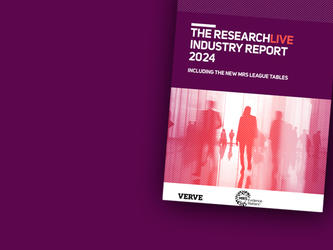Industry Report 2024: An independent perspective

“The Covid lockdowns opened many clients’ eyes to the fact that you don’t need to have a big glass and steel office to be effective,” says Konrad Collao, founder of Craft. “It’s noticeable how little I am questioned over my business model now compared to pre-pandemic.”
While the independent and freelance model may be becoming more culturally accepted by client organisations, Collao still thinks there are barriers at “large corporate clients, who simply trust other large corporates – the big agencies – because they look and act like them. I’m reminded of the old adage: ‘nobody ever got fired for hiring IBM’.”
Ella Fryer-Smith, founder, Do You Research, thinks more clients are beginning to clearly recognise the value independent consultants can offer – particularly in groups of independents working together. “Often, independents have very specific areas of expertise and so being able to curate teams to meet niche project needs is a big plus. I’ve seen clients more proactively seeking out specialist input and actively encouraging smaller suppliers to bid for bigger pieces of work,” says Fryer-Smith.
Shazia Ali, founder of Mint Research, believes the role of the independent insight consultant has been evolving for a few years. Budget allocation, a need for advanced skillsets and ability to adapt and be flexible have all played a part in this, she adds. “An integrity and values driven approach allows for consultants to offer what clients are seeking more of in the current climate, which is collaboration, confidence, respect and honesty without compromise,” explains Ali. “It’s about having actionable conversations – not endless meetings.”
Reorganisation of structures at some large clients in the last year has meant that independent consultants with long-term relationships with clients can play a bigger role in being “a guardian of institutional knowledge”, says James McLintock, who runs insight freelancer collective Future Studio.
McLintock adds: “Insight buyers are under a lot of pressure, so the trend towards creating deliverables that can suit a variety of internal stakeholders’ needs, and be more readily actionable, continues.”
Clients are embracing working with independents, says McLintock. “The independent part of our sector offers a lot of flexibility, efficiencies and opportunities to access specialist skills. It’s a great compliment to the scale and productised services that the agencies can offer, and it seems increasing numbers of clients are recognising that.”
For Nick Bonney, founder, Deep Blue Thinking, there are three key reasons why independent researchers are attractive to brands: experience, flexibility and cost.
“Independent researchers tend to be more experienced and, as a client, you’re getting to work with someone at a senior level throughout rather than tasks being delegated down to junior resource as you may find in a traditional agency model,” says Bonney.
“Secondly, the engagement can be more flexible. I find we are working on a more continuous or partnership basis with clients rather than the debrief being the end of the project. Finally, we can’t escape the fact that independents are often cheaper than bigger agencies – as a client you’re not having to fund the shiny office or company away days, you’re just paying for the know-how.”
Collao also points to clients valuing the personal relationship they have with an individual, which is often based on a longstanding partnership. “In these cases, independent researchers (who also bring a level of seniority and business acumen, not just research skills) can often act more as evidence-led strategy consultants than purely ‘researchers’,” adds Collao.
Additionally, independents are often able to create bespoke teams under the direction of a senior researcher who will remain involved in the project from start to finish, says Collao. “This differentiates us from some agencies, where directors ‘top and tail’ projects (only appearing and being involved at the pitch and debrief), and where the project team is often decided by internal resourcing considerations (who has time), not suitability for the brief (who is best for the job).”
However, clients must establish whether they want more boutique service, which may not necessarily translate to a lower price, or whether they want a more cost-effective approach, he adds.
Challenging environment
A tough economic climate has brought specific challenges for independent researchers. “It’s been a bit of a stop-start year due to various factors including the current economy, with clients stalling at times, and projects being pushed,” says Fryer-Smith. “This can be harder to manage as a small agency or independent.”
Collao says: “There does seem to be a slowdown in the market, so work is more difficult to come by. Thankfully I have strong relationships and benefit from a lot of repeat business, but even in these cases pitches are more competitive, budgets seem more likely to be pulled after pitches have been conducted or proposals have been written. It’s taking longer to get projects signed off as there is more scrutiny on budgets.”
Further evidence of a slowdown, adds Collao, is that he is receiving far more offers of availability from freelance researchers who work with agencies (as opposed to working directly with brands) than ever before.
Managing faltering commitment can be difficult, says McLintock. “We’ve been very lucky through what has been a difficult year for lots of independents and agencies, but it has been challenging staying positive when projects go from being a sure thing, to being delayed, to just disappearing, particularly if we’re holding time for people to try and make something work. It’s no one’s fault obviously as it’s ultimately an outcome of institutional pressures, but managing volatile levels of commitment to projects – when as independents we only get to sell our time once – has been frustrating at times.”
Late payments have also become an increasingly pressing issue for freelancers, notes Bonney – costing independents in the time spent chasing payment. “I may be cynical but, as interest rates have risen, there is a greater incentive for businesses to hold cash reserves. As an independent it becomes so time consuming and utterly demoralising having to continue to chase to be paid – we don’t have finance teams to do this for us so it has a direct impact on the amount of time we can spend on the real work.”
Looking ahead
Bonney predicts the economic environment will continue to impact how research is commissioned in 2024, including longer wait times for decisions to be signed off, for example.
He adds: “The other broad theme is one of polarisation with growth in either the largescale or the small and nimble. For example, more mid-sized agencies getting swallowed up into bigger ‘groups’ and smaller, more agile offerings continuing to thrive. Additionally, continued focus on speed and data integration in the ‘big tech’ side of the industry, but greater recognition that we are, at the end of the day a, people business and that’s what creates value.”
The trajectory of artificial intelligence has already impacted the research sector in the past year, since the advent of generative AI, which, along with other technologies, will weave itself into existing ways of working, says Ali. “The research industry landscape has never remained static – it can’t. We are an industry that guides other sectors, and for that reason there’s always been the need to be open minded, agile and keep developing. Quality and ethics will be ongoing conversations and areas of focus overriding the need for speed. The convergence of tech and human skills dialling up the best thinking will be important. It’s one of the most exciting industries to be part of right now.”
With AI expected to have a bigger impact on the industry in 2024, Fryer-Smith reaffirms the continued importance of independents having a point of difference: “I think researchers need to be clear on where and how they are bringing added value to clients, and again, this comes down to specialist knowledge and the power of collaboration.
This article was first published in the Research Live Industry Report 2024. You can download the report by signing in here.
Another article from the report delves into the issues facing research agencies and client-side insight teams.

We hope you enjoyed this article.
Research Live is published by MRS.
The Market Research Society (MRS) exists to promote and protect the research sector, showcasing how research delivers impact for businesses and government.
Members of MRS enjoy many benefits including tailoured policy guidance, discounts on training and conferences, and access to member-only content.
For example, there's an archive of winning case studies from over a decade of MRS Awards.
Find out more about the benefits of joining MRS here.














0 Comments